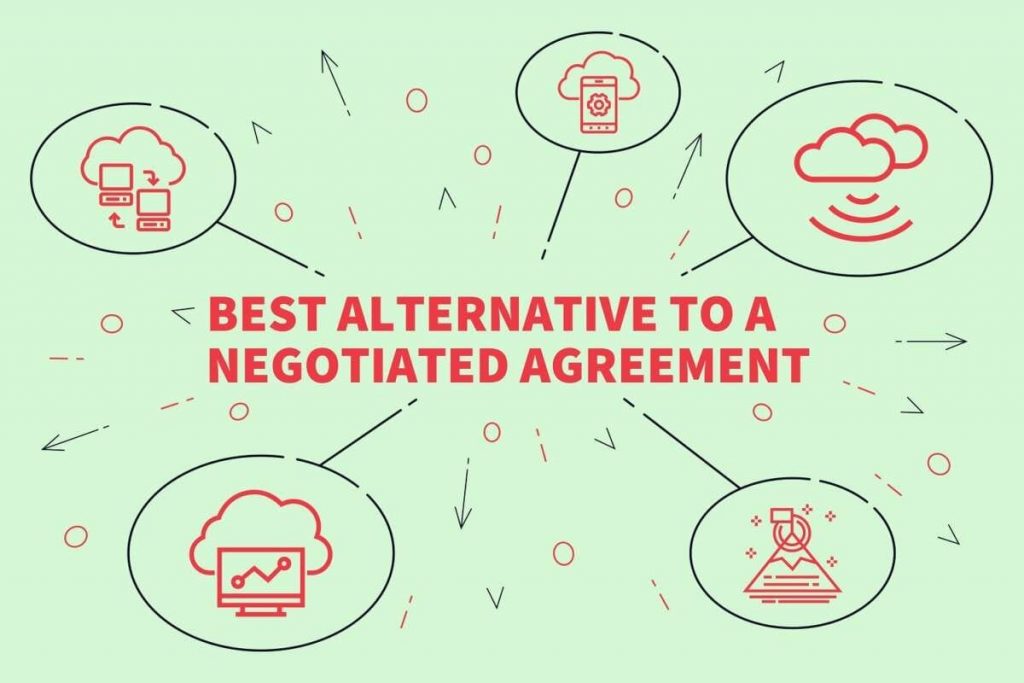Negotiation is a process and art of communicating back and forth for the purpose of reaching a joint agreement about differing needs or ideas. Several experienced Mediators and Negotiators have referred to negotiation as being a functional exercise in influence and strategy for moving people through a process towards a joint workable solution. Negotiation has two main strategies; one, is to shape the perceptions of the other party and two, is to get the best and final offer from the other party.
Life is a series of negotiation. Whether we think about or not, we virtually negotiate something everyday. From a business perspective we negotiate contract terms, purchase order pricing, terms of payment, service, strategic partnerships, resource allocation, project deadlines, human resources, etc. In our private life we negotiate car sales / leases, home purchases, rental agreements, personal services contracts, personal purchases and several other items. The list goes on but, simply put – we are always negotiating something.
“negotiation is how we secure and achieve things in life; it is our source of empowerment and engagement”
Jared Curhan, Professor, MIT School of Business
For some of us negotiation is something we enjoy and crave. For others it is uncomfortable and difficult. Hal Gregerson, Executive Director of the MIT Leadership Center says that this is a normal phenomenon because no one person negotiates or leads in precisely the same way. Unpredictability and a lack of certainty underscores the negotiating process. However, in negotiation there is one common thread that the other party asks and it can be boiled down only three questions; Can I trust you? Are you committed? Do you care about me? During the negotiation process it would be wise to keep these intrinsic questions in mind because, we need to give the other party what they need so we can get what we want. Being cognizant of this, it leads us to ten negotiating truisms that cannot be ignored if we are expected to be successful in the negotiating process.
Negotiating Truisms
- You cannot negotiate a good deal unless you know what a good deal looks like.
Hal Gregerson says it best when he says perhaps the most important question to ask is, what do I know and not know about all parties involved in the negotiating process? Effective negotiations are rarely spontaneous. Taking time to prepare, analyze and evaluate strategy is critical to negotiating success because it enables us to acknowledge our optimistic, pessimistic and most likely position. Inotherwords; What do I want? What do I need? What can I live with?
- It is never in your best interest to piss off the other party.
People are not foolish and they do not respond positively to threats, innuendo or emotional out bursts. Keeping discussions positive, non confrontational and always searching for common ground are cornerstones to successful negotiation. Emotions will always enter into negotiations. If people are committed to a successful outcome and pour their heart and soul into the efforts of negotiation; then emotions become part the process however, emotions must be focused and controlled. Acknowledging emotions as being real is a good antidote to emotional imbalances and diffuses the opportunity to damaging relationships.
- Negotiation is an exercise in information exchange.
When you enter the first phase of interaction with your negotiation counterpart your task is to initiate an exchange of information. This process has several positive effects on the whole subsequent negotiation. First, open communication can set a cooperative and also personal tone. Second, exchanging information helps both parties define the issues to be discussed and shares each party’s perceptions on those issues. Third, the parties begin to understand the relative importance of certain issues to both parties and where their interests might best be leveraged. When the “stakes” are high, information exchange can become very tactical if not strategic. Should the relationship between the parties be low or relatively non existent, expect some secrecy, bluffing and blustering at the beginning. If there is a positive and or trusting relationship between parties, expect a higher level of rapport building. The information exchange portion of the initial negotiation period ends when one party makes a concrete opening offer (setting the anchor) that requires a counter-offer by the other party. Attempt to establish rapport by focusing on interests and issues.
- Aggressive goals are good; aggressive behavior…………a killer.
All negotiating parties expect and respect aggressive goals. I remember listening to Zig Ziglar and he would say: “Shoot for the moon, even if you miss you still fall amongst the stars”. How many times have you attempted to sell something and wanted $ 100 so, you’d ask $ 125 and hope to walk away with
$ 100 (or something in that area). Well negotiation can be much the same way. People respect aggressive goals providing they are somewhat reasonable.
“shoot for the moon, even if you miss you still fall amongst the stars”
Hilary Hinton “Zig” Ziglar, Author & Motivational Speaker
On the other hand negotiating parties frown on aggressive behavior. For the most part aggressive behavior is seen as being degrading, immature and places the other party on the defensive. This is how negotiating wars are caused. When one party goes on the defensive, egos and emotions come into play and professional productive discussions are derailed.
It also is to our advantage to recognize that aggressive behavior:
- is sometimes based on emotions,
- usually incites a counter threat that may dwarf your own,
- may cost you more than it costs the other party,
- is counter productive to your credibility.
- In negotiation, your reputation is everything.
In the article publish in January of 2020, Harvard Law School reported that in multi-issue business negotiations, research suggests that the advantage goes to negotiators with a reputation for collaboration rather than competition. In a series of studies by Catherine H. Tinsley and Kathleen O’Connor, participants were told they would be negotiating with someone who had either a tough reputation, a cooperative reputation, or an unknown reputation. Although this information was fictitious and randomly assigned, it had a major impact on participants’ expectations during the negotiation process and ultimately, on both sides’ outcomes.
Specifically, negotiators with a reputation for tough, self-interested bargaining fared worse than did those whose reputation was unknown. What’s more, negotiators with a reputation for effective collaboration achieved better deals than did those with a competitive or an unknown reputation.
- Learn to love your “BATNA”
“BATNA” is an acronym that stands for Best Alternative To a Negotiated Agreement. It is defined as the most advantageous alternative that a negotiating party can take if negotiations fail and an agreement cannot be made. In other words, a party’s “BATNA” is what a party’s alternative is if negotiations are unsuccessful. The term “BATNA” was originally used by Roger Fisher and William Ury in their 1981 book entitled “Getting to Yes: Negotiating Without Giving In.” The importance of a “BATNA” is often used in negotiation tactics and should always be considered before a negotiation takes place. It is never wise to enter into any type of negotiation without knowing and loving your “BATNA”. The value of knowing your best alternative to a negotiated agreement is that: it provides an alternative if negotiations fall through, it provides negotiating power and it determines your reservation point (worst solution you are willing to accept).

- Know when to say “NO”
Although this might be perceived as being arrogant, it may be your best option at the time. Saying no buys all parties time to reassess the situation and look more closely at an integrative bargaining strategy.
- Sometimes the best deals are the ones that are never made.
I’d like to go back to 1961. In August of that year the Buffalo Bills were an “AFL” team and just in the middle of pre season spring training. The Hamilton Tiger Cats were a “CFL” team and a very good one at that. The Tiger Cats were somewhere in the middle of their regular season schedule and the Bills played an exhibition game in Hamilton at the old Civic Stadium against those Tiger Cats. The Bills were beaten solidly (38 -21) on the night of August 8. After that game; Bills owner Ralph Wilson approached Tiger Cats owner Bill Southam about buying the Hamilton Tiger Cats. Mr. Wilson offered Mr. Southam the Bills and $ 25,000 USF (equivalent to $ 20,000 CDN at that time) for the Tiger Cats. Mr. Southam thanked Mr. Wilson for his offer and politely declined and Mr. Wilson walked away disenchanted. How did that work out for Mr. Wilson? Remember Mr. Wilson’s estate sold the Bills to Terry and Kim Pegula for approximately $ 1.85 Billion USF in October of 2014.
- Negotiation is not a debate.
Nobody in the negotiation process wants to hear you pontificate the value and benefits of your position. The victim position doesn’t work, nor does the benefactor approach. All parties think their position is unique and of value. Remember, taking up too much time discussing the virtues of your position is of no consequence to the other party. They find it insulting and degrading. Listen and show empathy.
10.Never take it personal, its just business.
Business is business. All parties must make decisions not only based on the
best information available, decisions must be made in the best interest of their constituents. Remember, some people at the table have their livelihood at stake during the negotiation process and they are seeking the best solution / offer from the other party. No party wishes to leave value on the table, settle for to little or agreeing to a solution that will lead to a worse future position. Expect to be disappointed, it isn’t personal – its just business.
In the end, the bigger picture in the negotiating process is to create, develop and maintain valuable relationships that lead to discovering solutions to all challenges. Asking the tough questions, doing your homework and showing understanding will enable you to determine what you and the other side need and want. This in turn provides balance that can lead to a healthier environment in life and the workplace.
About The Author.
Nicholas Pollice is President of The Pollice Management Consulting Group located in Southern, Ontario, Canada. An international presenter and consultant, he is known as a leader in operations management. Nicholas conducts programs in leadership, supervision, communication, negotiation and conflict resolution. He has been a consultant since 1989 and is the author of several professional publications. His presentations have been consistently ranked in the top10 % throughout North America. See Nicholas’ bio, his other publications and services on the PMCG. Website at www.pollicemanagement.com


